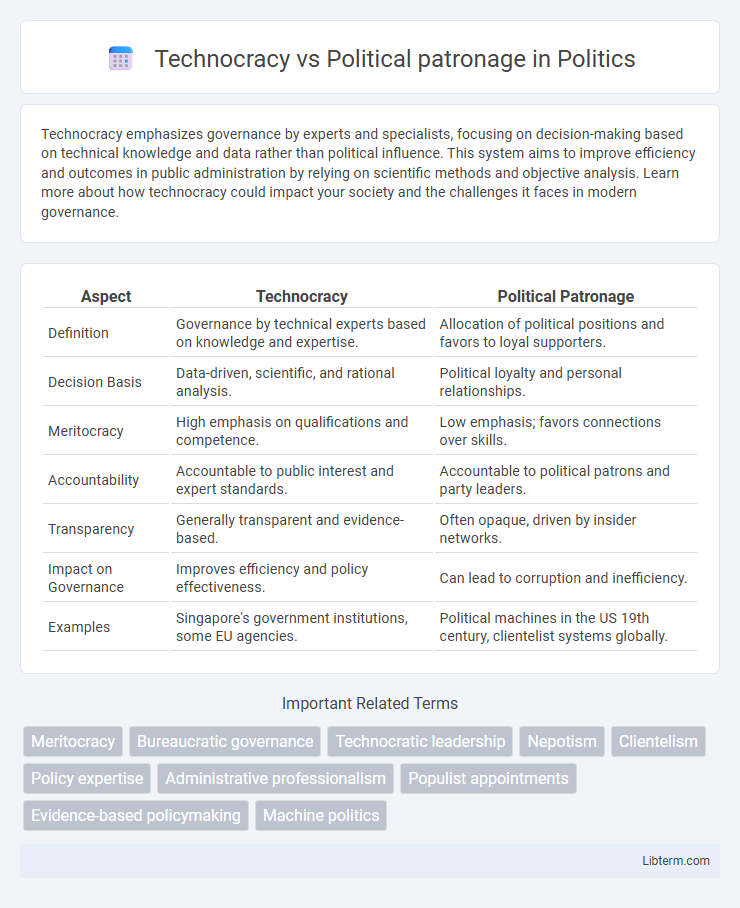Technocracy emphasizes governance by experts and specialists, focusing on decision-making based on technical knowledge and data rather than political influence. This system aims to improve efficiency and outcomes in public administration by relying on scientific methods and objective analysis. Learn more about how technocracy could impact your society and the challenges it faces in modern governance.
Table of Comparison
| Aspect | Technocracy | Political Patronage |
|---|---|---|
| Definition | Governance by technical experts based on knowledge and expertise. | Allocation of political positions and favors to loyal supporters. |
| Decision Basis | Data-driven, scientific, and rational analysis. | Political loyalty and personal relationships. |
| Meritocracy | High emphasis on qualifications and competence. | Low emphasis; favors connections over skills. |
| Accountability | Accountable to public interest and expert standards. | Accountable to political patrons and party leaders. |
| Transparency | Generally transparent and evidence-based. | Often opaque, driven by insider networks. |
| Impact on Governance | Improves efficiency and policy effectiveness. | Can lead to corruption and inefficiency. |
| Examples | Singapore's government institutions, some EU agencies. | Political machines in the US 19th century, clientelist systems globally. |
Understanding Technocracy: Definition and Principles
Technocracy centers on governance by experts and technical specialists, emphasizing decision-making based on data-driven analysis and scientific methods rather than political influence or favoritism. Its core principles include meritocracy, efficiency, and rational planning, aiming to optimize public policy through specialized knowledge and technical competence. This approach contrasts with political patronage, where appointments and decisions often prioritize loyalty over expertise, potentially undermining effective governance.
Political Patronage Explained: Key Concepts
Political patronage involves the allocation of government positions, contracts, and favors to individuals or groups based on loyalty, support, or affiliation rather than merit or expertise. This system often results in the reinforcement of political alliances and the consolidation of power by rewarding supporters with tangible benefits. Key concepts include clientelism, nepotism, and favoritism, which contrast sharply with technocracy's emphasis on professional qualifications and evidence-based decision-making.
Historical Evolution of Technocracy
Technocracy emerged during the early 20th century as a response to inefficiencies in traditional political systems, advocating for governance by technical experts rather than political patrons. Its roots trace back to the Progressive Era, where industrial efficiency and scientific management inspired calls for decision-making based on technical knowledge instead of political influence. Over time, technocratic ideals influenced various government reforms and policy approaches, contrasting sharply with the entrenched system of political patronage that relies on loyalty and partisan appointments.
Political Patronage in Governance Systems
Political patronage in governance systems entails the appointment of government positions based on loyalty and support rather than merit or expertise. This practice often leads to inefficiency and corruption as qualified candidates are overlooked in favor of political allies, weakening institutional integrity. The dominance of patronage undermines technocratic governance, which prioritizes specialized knowledge and evidence-based decision-making.
Efficiency and Accountability: Technocracy’s Strengths
Technocracy emphasizes efficiency by prioritizing expertise and evidence-based decision-making, reducing delays caused by political negotiations. Accountability in technocratic systems is often measured through performance metrics and objective outcomes, enhancing transparency in governance. This approach minimizes patronage-related favoritism, ensuring resources are allocated based on competence rather than political loyalty.
Corruption and Clientelism: Risks of Political Patronage
Political patronage increases corruption risk by enabling favoritism in resource allocation and public appointments, undermining meritocracy. Clientelism thrives as politicians exchange goods or services for electoral support, distorting governance and public trust. Technocracy limits these risks by emphasizing expertise and transparency in decision-making, reducing opportunities for abuse of power.
Case Studies: Technocratic vs Patronage-led Governments
Technocratic governments, as seen in Singapore under Lee Kuan Yew, prioritize expertise and meritocracy to drive economic growth and policy efficiency, leading to stable development and global competitiveness. In contrast, patronage-led governments like those in parts of Latin America often rely on clientelism and political favoritism, resulting in corruption and weakened institutional capacity. Case studies highlight that technocratic regimes typically achieve higher governance quality and sustainable progress compared to patronage systems plagued by nepotism and inefficiencies.
Public Perception and Social Impact
Public perception of technocracy often highlights trust in expertise and data-driven decision-making, while political patronage is frequently criticized for fostering favoritism and corruption. Social impact under technocracy can lead to more efficient and transparent governance, enhancing public services and policy outcomes. In contrast, political patronage may exacerbate inequality and reduce social cohesion by prioritizing loyalty over merit.
Technocracy vs Political Patronage: Balancing Governance Models
Technocracy emphasizes governance by experts with specialized knowledge, aiming for efficient and data-driven policy decisions, while political patronage relies on loyalty networks and the distribution of favors to maintain power. Balancing these models requires integrating technocratic expertise with political responsiveness to ensure both competent administration and democratic legitimacy. Effective governance often results from a hybrid approach that values meritocratic principles alongside inclusive political representation.
Future Trends and Policy Recommendations
Technocracy is poised to gain traction as data-driven decision-making and expert governance become critical in addressing complex global challenges such as climate change and digital transformation. Political patronage risks fostering inefficiency and corruption, undermining public trust and policy effectiveness, especially in emerging economies experiencing rapid social change. Policy recommendations include institutionalizing merit-based appointments and enhancing transparency mechanisms to balance technocratic expertise with democratic accountability.
Technocracy Infographic

 libterm.com
libterm.com